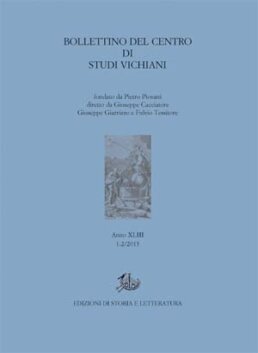Bollettino del Centro di Studi Vichiani Vol.XLIII/1-2
Matteo Palumbo, Cuoco, Foscolo and a chapter of Vico’s fortune.
The paper examines the role of Vincenzo Cuoco in the intellectual history of Foscolo. The influence which he exercises acts under two points of view. Vincenzo Cuoco implies a precise judgment on the failure of the revolution of 1799: passive revolution, unable to modify the conditions of men and of their existence. Foscolo takes up the thesis of Cuoco in his writings on the Neapolitan revolution, taken as an example of the tendencies of modern history, and also in the letters of the novel Ultime lettere di Jacopo Ortis. Vincenzo Cuoco, however, does not leave to Foscolo only a model of historical judgments. Along with the other Neapolitan patriots, he contributes significantly to the movement of Giambattista Vico. Foscolo draws from the principles of the Scienza nuova especially the idea of lyric poetry. It has a theological function and legislator and shows men the eternal and universal principles of politics and morality. The meeting of exiled Neapolitan and Venetian in Milan thus becomes the laboratory of a united Italian culture
Carlamaria Lucci, Giambattista Vico as Reader and Interpreter of the Homeric Poems in the New Science (1744): between History, Anthropology and Antiquarian Studies.
The historical anthropological approach to Ancient Civilizations, and in particular to Homeric Greece, that Vico had been developing between the first and the third edition of the New Science, has been increasingly acknowledged by scholars during the last forty years. This article aims to show, basing on an analysis of the text of the third edition (1744), what, in real terms, the reading and interpretation of the Homeric Poems the Neapolitan thinker advances consisted in. Namely, I will try to show to what extent Vico’s focus on the diachronic aspects of epic tradition should be linked to a specifically philological and antiquarian interest, rather than to a generic esprit de système rooted in the so called ‘theory of the three ages’.
Roberto Evangelista, The flare of the True. Verity and History in Giambattista Vico
This Essay deals with the relation between truth and history in Vico, pointing out the human knowledge and the concept of experience in the historical development of Mankind. In this field of inquiry, I would consider the tension between the General and the Particular, and between the Abstract and the Concrete, which is developed in Vico’s thought. The problem discussed concerns both the field of the modality of human knowledge, and the field of the right and the law. It is possible to follow the genesis of the History and its revelation in the human deeds (that is the factum) and in its link with the truth of the Providence (that is the verum). The Universali fantastici and the fancy allow to find the real force of the human ingenium and with it, they allow to inquiry the historical development of the providence in his concreteness, by finding the truth in the human history.
SCHEDE E SPUNTI
Leonardo Pica Ciamarra, P. Perotus. Recognition of a person mentioned in the De Ratione
This article reconstructs the identity of a person cited by G. Vico in his De nostri temporis studiorum rationewith the name P. Perotus(or Peroto, Perot, Perotti, as it has been variously translated). Vico mentions him as the naval theoretician who made an attempt to build an ideal ship according to the rules of Cartesian analytical geometry and failed miserably. For more than three hundreds years it has been impossible to identify the person and the case Vico refers to. Using documents of the time, this article propose to identify Vico’s ‘pater Perotus’ as the French jesuit Paul Hoste, mathematician and teacher in Toulon naval school at the end of the 17th Century.
INDICE
Manuela Sanna, Paola Volpe, Ricordo di Antonio Garzya
- Matteo Palumbo, Cuoco, Foscolo e un capitolo della fortuna di Vico
- Carlamaria Lucci, Vico lettore e interprete dei poemi omerici nella Scienza nuova (1744): fra storia, antropologia e antiquaria
- Roberto Evangelista, II balenare del vero. Veritä e storia in Giambattista Vico
SCHEDE E SPUNTI
- Leonardo Pica Ciamarra, P. Perotus: per l’identificazione di un personaggio citato nel De ratione
- Josfi M. Sevilla, Contributi alla critica di me stesso. Riflessioni intorno alla presentazione del mio libro Prolegomenos para una critica de la razon problematica. Con una nota di Fulvio Tessitore
- Daniel Canaris, Fabrizio Lomonaco, Roberto Mazzola, Barbara Naddeo, Discussione su Vico and Naples
NOTE CRITICHE
- Gustavo Costa, Considerazioni filologico-filosofiche su una nuova edizione del De antiquissima
- Raffaele Ruggiero, II Diritto universale all’estero in edizioni recenti
- Alessia Scognamiglio, Una recente traduzione del De ratione
- Raffaele Carbone, Vico e l’Oriente
- Daniel Canaris, Vico, Rhetoric and Modernity
- Luka Bogdanic, Un contributo di Lino Veljak agli studi vichiani in Croazia
- Roberto Mazzola, Editoria e scienza in etä moderna
- Raffaele Ruggiero, Il congedo dei «New Vico Studies»
AVVISATORE BIBLIOGRAFICO
